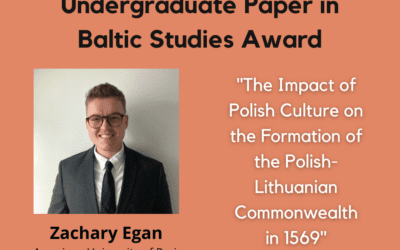AABS announces that Dace Dzenovska’s School of Europeanness: Tolerance and Other Lessons in Political Liberalism in Latvia has been awarded the 2020 AABS Book Prize. Three authors – Tomas Balkelis, Vincent Hunt, and Kevin O’Connor – received honorable mentions.
The 2020 Book Prize Committee, chaired by VP for Publications Dovilė Budrytė, selected the awardee and honorable mentions from a pool of 14 books that were nominated by the publishers, authors, or their colleagues. The Committee noted the high level of all nominated books and solicited reviews for each of them. Dace Dzenovska’s book was praised as theoretically sophisticated, interesting argument about how international actors tried to ’civilize’ Latvia through the introduction of European liberalism. The book has been of interest not only to scholars, but also to NGOs and other members of civil society in Latvia. It is a significant contribution to several disciplines in the Baltic studies: political science, sociology and anthropology, to mention a few.
The three honorable mentions received similar praise. Tomas Balkelis’ War, Revolution, and Nation-Making in Lithuania, 1914–1923 is a path-breaking book in the study of Lithuanian statehood and an extremely important study for trying to bridge the still relatively large gap between the Western and East European scholarship on the First World War. Vincent Hunt’s Up Against the Wall: The KGB and Latvia integrates many personal testimonies from ordinary citizens of Latvia, and thus enriches the study of the Soviet period in Latvia while making a persuasive argument that Latvians were key players in the establishment of the Soviet security forces. Kevin O’Connor’s The House of Hemp and Butter: A History of Old Riga is a historical study that situates the city of Riga between multiple ‘national’ and ethnic histories, navigating multiple religious contexts. The book is both broad and deep as it traces Riga’s religious and economic importance as well as the diverse people groups that lived, worked, and ruled the city.
The biennial AABS Book Prize of $1,000 is awarded to an outstanding English-language scholarly book in Baltic Studies (humanities and social sciences). The 2020 award covers books published in 2018 and 2019. AABS congratulates the winner and honorable mentions of the 2020 award and thanks everyone who submitted a nomination.
School of Europeanness: Tolerance and Other Lessons in Political Liberalism in Latvia, by Dace Dzenovska, Ithaca:, Cornell University Press, 2018.
Drawing on ethnographic research on tolerance promotion in Latvia in 2000s, Dace Dzenovska’s book traces the contours of “actually existing” political liberalism after the Cold War. Dzenovska argues that post-Cold War liberalism as a historical formation comes into view most clearly in liberalism’s missionary encounters with people thought to have lost their way as a result of living under “actually existing socialism.” These encounters show the underlying tensions of post-Cold War political liberalism in Europe, such as the need to draw boundaries around liberal democratic polities while emphasizing the virtues of inclusion, openness, and tolerance. Ultimately, they reveal the actually existing post-Cold War liberalism to be an ideological formation that misrecognizes itself as a politically neutral set of tools for organizing collective life.

Dace Dzenovska (PhD, University of California, Berkeley) is Associate Professor of the Anthropology of Migration at the University of Oxford. Her research areas include: geopolitics of mobility and migration; forms of statehood, sovereignty and capitalism in post-Cold Eastern Europe and the former Soviet Union; and postsocialism as a critical lens for analysis of late liberalism. In addition to School of Europeanness, she is the author of the Latvian-language book Aizbraukšana un tukšums Latvijas laukos (Departure and Emptiness in the Latvian Countryside). She is also the recipient of the European Research Council Consolidator Grant (2019) for a project on the emptying cities, towns, and villages in Eastern Europe and Russia.
War, Revolution, and Nation-Making in Lithuania, 1914–1923, by Tomas Balkelis, Oxford, Oxford University Press, 2018.
The book explores how the Great War and the ensuing postwar conflict created and shaped the Lithuanian state from 1914 to the last waves of violence in 1923. As the very notion of independent Lithuania was constructed during the war, violence was an essential part of the formation of Lithuanian state, nation, and identity. War was much more than simply the historical context in which the tectonic shift from empire to nation-state took place. It transformed people, policies, institutions, and modes of thought in ways that would continue to shape the nation for decades after the conflict subsided.
In telling the story of the armed conflict in Lithuania, “War, Revolution, and Nation-Making in Lithuania, 1914-1923” focuses on the soldiers and civilians involved in the conflict, rather than the strategies and acts of politicians, generals, or diplomats. The volume’s two main themes are the impact of military, social, and cultural mobilizations on the local population, and different types of violence that were so characteristic of the region throughout the period. The actors in this story are people displaced by war and mobilized for war: refugees, veterans, volunteers, peasant conscripts, POWs, paramilitary fighters, and others who took to guns, not diplomacy, to assert their power. This is the story of how their lives were changed by war and how they shaped the society that emerged after war.

Tomas Balkelis (PhD, University of Toronto) is a senior research fellow at the Lithuanian Institute of History in Vilnius. He received his Ph.D. in History at the University of Toronto in 2004. After graduation he worked at the Universities of Manchester and Nottingham. In 2009-2013, he was a European Research Council Postdoctoral Research Fellow at University College Dublin. He also led a Lithuanian Research Council funded team of historians based at Vilnius University working on the population displacement in Lithuania in the 20th. In 2015-2016 he was a visiting fellow at Stanford University. He is the author of The Making of Modern Lithuania (Routledge, 2009) and War, Revolution and Nation-Making in Lithuania (Oxford, 2018). His articles have been published by Past and Present and Contemporary European History. His research fields include nation-building, national mythmaking, forced migrations, population displacement and paramilitary violence.
Up Against the Wall: the KGB and Latvia, by Vincent Hunt, Helion and Company, 2019.
Blending documentary journalism, oral history and travelogue, Latvia’s twisted relationship with the Soviet security police over a century is laid bare in brutal detail in this book, as first the Latvian Riflemen helped Lenin to power, then fifty years of totalitarianism followed Stalin’s purges. Eye witnesses tell vivid stories of the partisan resistance, Cold War spying missions, deportations to Siberia and human rights protests, ending with the opening of the ‘Cheka Bags’ in 2018, the KGB index of agents discovered when the Soviet Union collapsed.

An award-winning former BBC documentary journalist, Vincent Hunt explores little-told chapters of recent history in his books: the Nazis’ scorched earth destruction of northern Norway; the end of WWII in western Latvia and the untold story of the KGB in Soviet times. He teaches journalism in Manchester and is researching a PhD analyzing storytelling combining documentary methods with oral history and memory studies.
The House of Hemp and Butter: A History of Old Riga, by Kevin O’Connor, Northern Illinois University Press, Ithaca and London, 2019.
The House of Hemp and Butter is the very first English-language history of early Riga. It begins in the twelfth century with the arrival to the eastern Baltic of German priests, traders, and knights, who conquered and converted the indigenous tribes and assumed mastery over their lands. It ends in 1710 with an account of the greatest war Livonia had ever seen, one that was accompanied by mass starvation, a raging epidemic, and a flood of nearly Biblical proportions that devastated the city and left its survivors in misery.
If The House of Hemp and Butter is an urbanography that is embedded in its broader regional and international context, the book’s main focus is always the city itself, populated by merchants and clerics, craftsmen and builders, porters and day laborers. Readers will learn about the city’s structures and spaces, its peoples and its rhythms, its internal conflicts and its unrelenting struggle to maintain its traditional independence against outside threats. Intended both for readers of history as well as for curious travelers, The House of Hemp and Butter is essential reading for anyone who plans to spend any amount of time in the city of Riga.

Kevin O’Connor is a Professor of History at Gonzaga University in beautiful Spokane, Washington, where he teaches courses in European and Russian history. His books include The House of Hemp and Butter: A History of Old Riga; The History of the Baltic States; Culture and Customs of the Baltic States; and Intellectuals and Apparatchiks: Russian Nationalism and the Gorbachev Revolution. Out of Kevin’s travels through the Baltic states was born a fascination with Latvia’s stunning capital, where on some summer mornings one might come upon him enjoying a croissant in a noisy cafe while fidgeting on his multivolume history of Rīga. When Kevin isn’t teaching or doing Latvia things, he can usually be found on the roads and trails of Spokane, where he runs and bikes and hikes and dreams of the sandy shores of the Amber Sea.
Other Awards & Prizes News
AABS Book Prize Awarded to Una Bergmane for “Politics of Uncertainty”
The Association for the Advancement of Baltic Studies is pleased to announce that Una Bergmane has been awarded the 2024 AABS Book Prize for her monograph Politics of Uncertainty: The United States, the Baltic Question, and the Collapse of the Soviet Union. The...
AABS Awards Vilis Vītols Prize to Best JBS Articles for 2022 and 2023
The Association for the Advancement of Baltic Studies is pleased to announce its selection of two Journal of Baltic Studies (JBS) articles to receive the 2022 and 2023 Vilis Vītols Article Prize. Kadri Aavik and Maarja Saar have been awarded the 2022 Prize for their...
AABS Announces 2022 Winners of the Undergraduate Paper in Baltic Studies Award
The AABS Board is pleased to announce two 2022 recipients of the Undergraduate Paper in Baltic Studies Award: Zachary Egan, for his paper "The Impact of Polish Culture on the Formation of the Polish-Lithuanian Commonwealth in 1569," and Ido Kons, for his paper, "A...




